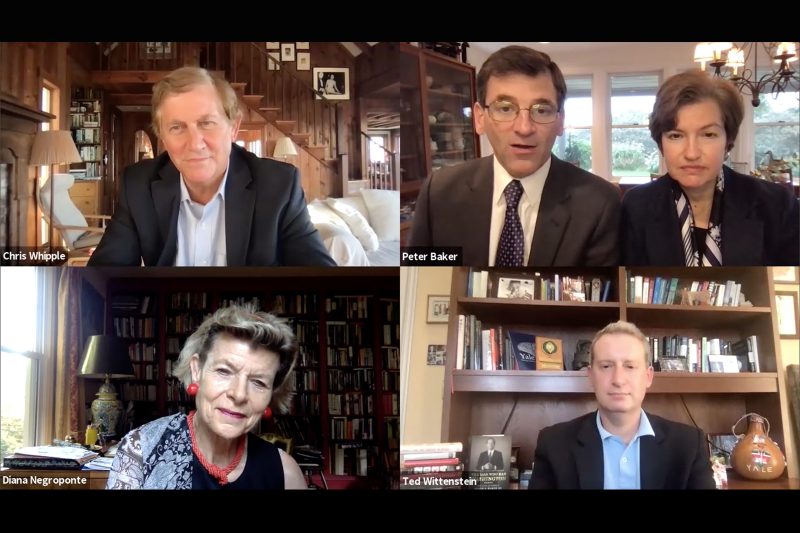On October 14, International Security Studies hosted Virtual Discussion Forum on James A. Baker III: Lessons for American Diplomacy and Our Political Future, featuring Peter Baker, Chief White House Correspondent of The New York Times; Susan Glasser, Staff Writer of The New Yorker; and Diana Negroponte, Global Fellow of The Wilson Center.
Two recent acclaimed biographies of Baker examine his pivotal role as U.S. Secretary of State in the final years of the Cold War as the Soviet Union unraveled:
“The Man Who Ran Washington: The Life and Times of James Baker III,” by Peter Baker and Susan Glasser and “Master Negotiator: The Role of James A. Baker III at the End of the Cold War,” by Diana Villiers Negroponte.
The session was moderated by Yale alum, author, and journalist Christopher Whipple, who kicked off the conversation by asking panelists to reflect on what mark Baker left on the world stage.
“Being a great and consequential Secretary of State requires a historical moment in time, when it’s possible for the United States to lead in certain ways,” said Glasser.
“That was a moment that arguably might not exist today, and then it also requires individual action. If you go back to the extraordinary nine months that followed the collapse of the Berlin Wall, in particular, that was probably the high watermark of Baker’s diplomacy and also of American diplomacy, arguably, since the end of World War II,” she said.
Negroponte highlighted the distinction between Baker and another notable Secretary of State, Henry Kissinger.
“Kissinger is a strategist, he’s an academic. Baker relied on others to develop the strategic response. What he brought to it was the ability to focus and with the mind of a brilliant lawyer to master all the details, understand where his opponent was coming from, and then with persistence and bullying and buying, get the deal. So that’s what makes him different,” Negroponte asserted.
Panelists were also asked to comment on Baker’s role in the peaceful dissolution of the Soviet Union and in the reunification of Germany.
“We don’t see empires dissolve peacefully it’s usually a violent blood-ridden enterprise,” Negroponte said. “Baker maintained tight control over the process. You were not allowed, as a member of the senior cabinet, to criticize the policy. You had to toe the line and that was to ensure that there was a single voice coming out of Washington at a particularly delicate time,” she said.
“Events were moving so quickly that the politicians in both Germany and the United States had to change their calibration of what was possible,” Peter Baker said.
“It was really a tough job for Jim Baker and [President George H.W.] Bush to deal with Margaret Thatcher and François Mitterrand, at the time, the President of France. They had fought two world wars against the Germans and were not eager to see one Germany, strong and in the center of Europe once again. But Baker, rather than seeing the obstacles, he saw the very, very narrow path through to a deal,” he said.
Panelists also took audience questions about Iraq’s invasion of Kuwait, Russia’s annexation of Crimea, and the Republican Party’s shift in the wake of the Trump presidency.
